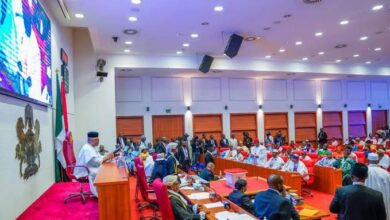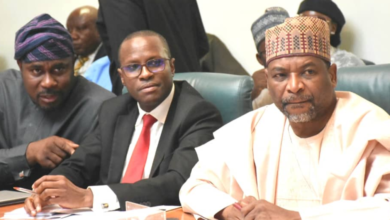BREAKING: Nigeria’s total public debt hits N144.67 trillion in December 2024

Nigeria’s total public debt rose to N144.67 trillion ($94.23 billion) as of December 31, 2024, reflecting a significant increase of 48.58% compared to N97.34 trillion ($108.23 billion) recorded at the end of December 2023.
This latest figure was disclosed by the Debt Management Office (DMO) in its report on the country’s public debt profile.
The report also indicated a quarter-on-quarter rise of 1.65% from the N142.32 trillion ($88.89 billion) recorded at the end of September 2024, highlighting the continued increase in the nation’s debt burden within the final quarter of the year.
Year-on-year analysis
An analysis of Nigeria’s public debt on a year-on-year basis reveals a notable increase of N47.32 trillion, representing a 48.58% rise from December 2023 to December 2024.
- The surge in public debt was driven primarily by significant increases in both external and domestic borrowings.
- Nigeria’s external debt rose substantially by 83.89% from N38.22 trillion ($42.50 billion) in December 2023 to N70.29 trillion ($45.78 billion) in December 2024.
- This sharp increase was largely attributed to new external borrowings obtained during the year, as well as the impact of the naira depreciation, which inflated the naira equivalent of dollar-denominated debt.
- Domestic debt also witnessed considerable growth, increasing by 25.77% from N59.12 trillion ($65.73 billion) at the end of December 2023 to N74.38 trillion ($48.44 billion) in December 2024.
The Federal Government’s domestic debt component rose significantly from N53.26 trillion to N70.41 trillion, a growth of 32.19%. This increase reflects the government’s continued reliance on local borrowing to finance budget deficits and infrastructure projects.
Conversely, the domestic debt owed by states and the Federal Capital Territory (FCT) saw a reduction from N5.86 trillion to N3.97 trillion, representing a decline of 32.27%.
The reduction in state-level borrowing indicates a cautious approach by some subnational governments towards debt accumulation within the year.
Quarter-on-quarter analysis
Compared to the preceding quarter, Nigeria’s total public debt rose by N2.35 trillion, translating to a 1.65% increase from N142.32 trillion reported as of September 30, 2024.
- The marginal rise within the quarter was driven by increases in both external and domestic debt components.
- External debt grew by N1.4 trillion, moving from N68.89 trillion ($43.03 billion) as of the end of September 2024 to N70.29 trillion ($45.78 billion) in December 2024.
- The increase within the quarter was influenced by additional foreign loans obtained in the last three months of the year, alongside the further weakening of the naira against major international currencies.
- On the domestic front, debt rose slightly by 1.29%, from N73.43 trillion ($45.87 billion) in September 2024 to N74.38 trillion ($48.44 billion) by the end of December. The Federal Government’s domestic debt increased from N69.22 trillion to N70.41 trillion within the quarter.
However, domestic debt attributed to states and the FCT reduced from N4.21 trillion to N3.97 trillion, reflecting a 5.69% decrease.
Debt composition
As of December 2024, external debt constituted 48.59% of Nigeria’s total public debt, while domestic debt made up 51.41%, indicating a relatively balanced debt structure.
- However, the continued increase in external borrowings suggests a growing reliance on foreign debt to bridge budgetary shortfalls.
- The breakdown of external debt shows that the Federal Government accounted for N62.92 trillion ($40.98 billion), while states and the FCT held N7.37 trillion ($4.80 billion).
- In the domestic debt segment, the Federal Government held N70.41 trillion ($45.86 billion), with states and the FCT accounting for N3.97 trillion ($2.58 billion).
What you should know
The rise in public debt has sparked concerns among economic analysts, given the potential implications for Nigeria’s fiscal stability.
- The sharp increase, particularly in external debt, highlights the vulnerability of the nation’s finances to exchange rate fluctuations and changes in global economic conditions. With the naira’s continued depreciation, the cost of servicing foreign debt could escalate, placing additional strain on the country’s financial resources.
- The government’s dependence on both external and domestic borrowing to fund critical projects points to underlying fiscal challenges, including revenue shortfalls and the need for substantial infrastructure investments.
- While domestic debt remains the larger component of the debt portfolio, the significant growth in external liabilities underlines the importance of a balanced approach to debt management, particularly in light of Nigeria’s limited foreign exchange earnings.
Financial experts have called for more prudent debt management practices, emphasizing the need to boost revenue generation through economic diversification and enhanced tax collection.
They warn that while borrowing can be necessary for development, it must be matched with strategic plans to ensure sustainability and avoid overburdening future budgets.








